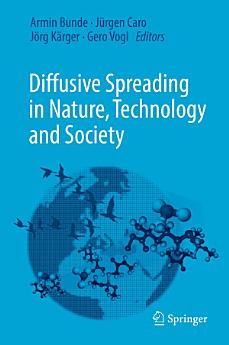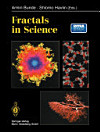Diffusive Spreading in Nature, Technology and Society
Dec 2017 · Springer
Ebook
418
Pages
reportRatings and reviews aren’t verified Learn More
About this ebook
This book deals with randomly moving objects and their spreading. The objects considered are particles like atoms and molecules, but also living beings such as humans, animals, plants, bacteria and even abstract entities like ideas, rumors, information, innovations and linguistic features. The book explores and communicates the laws behind these movements and reports about astonishing similarities and very specific features typical of the given object under considerations. Leading scientists in disciplines as diverse as archeology, epidemics, linguistics and sociology, in collaboration with their colleagues from engineering, natural sciences and mathematics, introduce the phenomena of spreading as relevant for their fields. An introductory chapter on “Spreading Fundamentals” provides a common basis for all these considerations, with a minimum of mathematics, selected and presented for enjoying rather than frustrating the reader.
About the author
Prof. Jörg KärgerProfessional Career1962 – 1968 Studying Physics at Leipzig University1968 – 1970 PhD-fellow Leipzig University, Dr. rer. nat. in Physics 19701970 – 1977 Scientific co-worker, Leipzig University1977 – 1982 Senior scientific co-worker, Leipzig University1978 Habilitation ("Promotion B")1982 – 1989 Lecturer, Leipzig University1989 – 1994 extraordinary Professor, Leipzig University1994 – April 2009 Professor with full chair (Interface Physics), Leipzig Universitysince April 2009 Professor emeritus, Leipzig University
Professional Activities and Memberships1996 – 1999 Dean of the Faculty of Physics and Earth Sciences at Leipzig University1996 – 1999 President of the German Zeolite Association, member of the FEZA Board (Federation of European ZeoliteAssociations)1997 – 2000 Ombudsman of Leipzig University2002 – 2006 Editorship www.diffusion-fundamentals.org (since 2003),Microporous and Mesoporous Materials (European Editor 2004 – 2008)
Membership in Editorial BoardsZeolites (1992 – 1997), Adsorption (since 1993), Microporous andMesoporous Materials (since 1993)Honours1978 Gustav-Hertz-Award of the German Physical Society1980 Leibniz-Medal of the German Academy of Sciences1986 Donald-W.-Breck Award of the International Zeolite Association (togetherwith H. Pfeifer, D. Freude and M. Bülow)1993 Max Planck Research Award of the Alexander-von-Humboldt Foundation and the Max-Planck-Society2000 Member of the Saxon Academy of Sciences2005 Theodor-Litt-Award of Leipzig UniversityResearch InterestExperiment andtheory of mass transfer and matter conversion in complex systems
CV of Jürgen CaroPosition: Professor (W3) for Physical Chemistry (chair)
Academic education and degrees1992 Dr. rer. habil. on the application of zeolitic molecular sieves as catalysts,adsorbents, nonlinear optical materials, sensor, membrane1989 Dr. sc. nat. on the diffusion influence in heterogeneous catalysis1977 Dr. rer. nat. on NMR studies of molecular diffusion in porous materials (Mentor: J. Kärger), „summa cum laude“1970-1977 Study of Chemistry, University Leipzig, American model: direct after Bachelor, start of PhD studyScientific careersince 2001 W3 Professor for Physical Chemistry, Leibniz University Hannover1994-2001 Leader of the Department „Advanced Materials“ at the Institute for AppliedChemistry in Berlin-Adlershof with the working fields ceramics, polymers,composites1992-1993 Formation of the new group „Nano-composites- molecular sieves as high-techmaterials“ at Center for Heterogeneous Catalysis of the KAI in Berlin-Adlershof1977-1991 Central Institute for Physical Chemistry of the former East German Academy ofSciences with the working fields adsorption, catalysis, porous materials, gasseparation, supercritical fluidsFurther activities and honours2013 Breck Award of the International Zeolite Association2013 Ostwald-Medal of the Saxonian Academy of Sciences at Leipzig2013-2016 Professor at the Chinese Academy of Sciences at Ningbo, China2014-2017 Visiting Professor at Dalian University of Technology, China2014-2017Part-time Professor of the University at Panjin, China
Professional Activities and Memberships1996 – 1999 Dean of the Faculty of Physics and Earth Sciences at Leipzig University1996 – 1999 President of the German Zeolite Association, member of the FEZA Board (Federation of European ZeoliteAssociations)1997 – 2000 Ombudsman of Leipzig University2002 – 2006 Editorship www.diffusion-fundamentals.org (since 2003),Microporous and Mesoporous Materials (European Editor 2004 – 2008)
Membership in Editorial BoardsZeolites (1992 – 1997), Adsorption (since 1993), Microporous andMesoporous Materials (since 1993)Honours1978 Gustav-Hertz-Award of the German Physical Society1980 Leibniz-Medal of the German Academy of Sciences1986 Donald-W.-Breck Award of the International Zeolite Association (togetherwith H. Pfeifer, D. Freude and M. Bülow)1993 Max Planck Research Award of the Alexander-von-Humboldt Foundation and the Max-Planck-Society2000 Member of the Saxon Academy of Sciences2005 Theodor-Litt-Award of Leipzig UniversityResearch InterestExperiment andtheory of mass transfer and matter conversion in complex systems
Prof. Dr. Gero Vogl, Wien Dr.phil. (Physik, Universität Wien), Dr. rer.nat.habil. (TU München) Emer. Professor
1965 Dr.phil.
1966 assistent physics department TU München
1970 head low temperatur lab TU München
1974 Habilitation
1975 associate professor TU München
1977 professor physics (C3) FU Berlin
1985-2009 prof. physics University Wien
1999 department head Hahn-Meitner-Instituts Berlin
1990-1991 member scientific couoncil integration AdW of DDR
1991-1993 responsible for evaluation der physics research Autria
1991-1998 speaker „Nuclear Solid State Sciences Austsria
2002 coordinator net Materials Dynamics BMWFT, international collaboration
2002-2004 president Austrian Physical Society
CV of Jürgen CaroPosition: Professor (W3) for Physical Chemistry (chair)
Academic education and degrees1992 Dr. rer. habil. on the application of zeolitic molecular sieves as catalysts,adsorbents, nonlinear optical materials, sensor, membrane1989 Dr. sc. nat. on the diffusion influence in heterogeneous catalysis1977 Dr. rer. nat. on NMR studies of molecular diffusion in porous materials (Mentor: J. Kärger), „summa cum laude“1970-1977 Study of Chemistry, University Leipzig, American model: direct after Bachelor, start of PhD studyScientific careersince 2001 W3 Professor for Physical Chemistry, Leibniz University Hannover1994-2001 Leader of the Department „Advanced Materials“ at the Institute for AppliedChemistry in Berlin-Adlershof with the working fields ceramics, polymers,composites1992-1993 Formation of the new group „Nano-composites- molecular sieves as high-techmaterials“ at Center for Heterogeneous Catalysis of the KAI in Berlin-Adlershof1977-1991 Central Institute for Physical Chemistry of the former East German Academy ofSciences with the working fields adsorption, catalysis, porous materials, gasseparation, supercritical fluidsFurther activities and honours2013 Breck Award of the International Zeolite Association2013 Ostwald-Medal of the Saxonian Academy of Sciences at Leipzig2013-2016 Professor at the Chinese Academy of Sciences at Ningbo, China2014-2017 Visiting Professor at Dalian University of Technology, China2014-2017Part-time Professor of the University at Panjin, China
Rate this ebook
Tell us what you think.
Reading information
Smartphones and tablets
Install the Google Play Books app for Android and iPad/iPhone. It syncs automatically with your account and allows you to read online or offline wherever you are.
Laptops and computers
You can listen to audiobooks purchased on Google Play using your computer's web browser.
eReaders and other devices
To read on e-ink devices like Kobo eReaders, you'll need to download a file and transfer it to your device. Follow the detailed Help Center instructions to transfer the files to supported eReaders.





